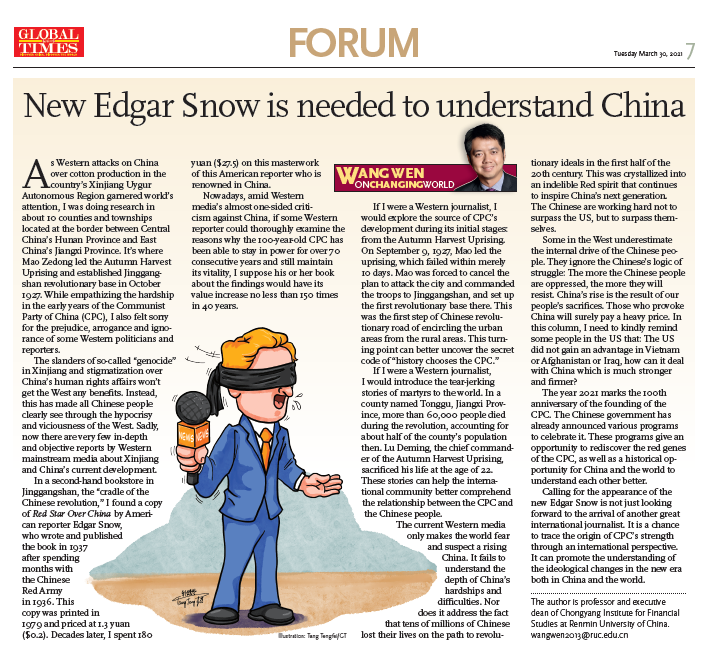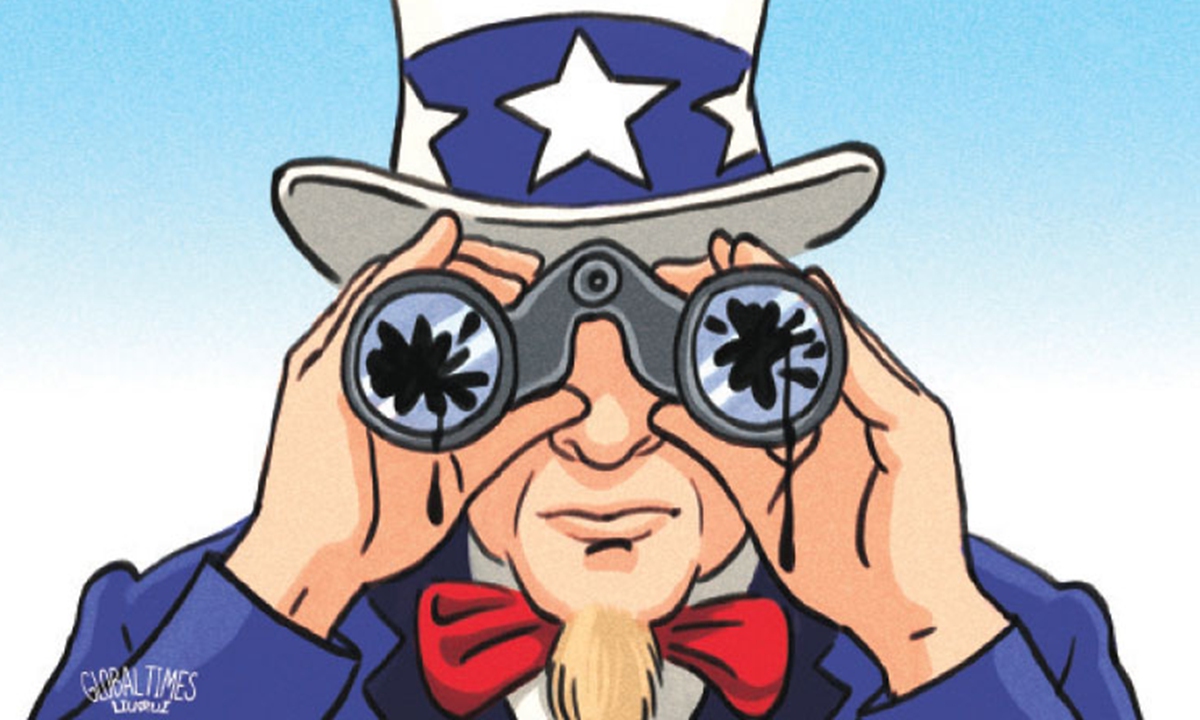Picture
Your Present Location: HOME> PictureWang Wen: New Edgar Snow is needed to understand real China
By Wang Wen Source: Global Times Published: 2021-03-30
 \
\
As Western attacks on China over cotton production in the country's Xinjiang Uygur Autonomous Region garnered world's attention, I was doing research in about 10 counties and townships located at the border between Central China's Hunan Province and East China's Jiangxi Province. It's where Mao Zedong led the Autumn Harvest Uprising and established Jinggangshan revolutionary base in October 1927. While empathizing the hardship in the early years of the Communist Party of China (CPC), I also felt sorry for the prejudice, arrogance and ignorance of some Western politicians and reporters.

The slanders of so-called "genocide" in Xinjiang and stigmatization over China's human rights affairs won't get the West any benefits. Instead, this has made all Chinese people clearly see through the hypocrisy and viciousness of the West. Sadly, now there are very few in-depth and objective reports by Western mainstream media about Xinjiang and China's current development.
In a second-hand bookstore in Jinggangshan, the "cradle of the Chinese revolution," I found a copy of Red Star Over China by American reporter Edgar Snow, who wrote and published the book in 1937 after spending months with the Chinese Red Army in 1936. This copy was printed in 1979 and priced at 1.3 yuan ($0.2). Decades later, I spent 180 yuan ($27.5) on this masterwork of this American reporter who is renowned in China.
Nowadays, amid Western media's almost one-sided criticism against China, if some Western reporter could thoroughly examine the reasons why the 100-year-old CPC has been able to stay in power for over 70 consecutive years and still maintain its vitality, I suppose his or her book about the findings would have its value increase no less than 150 times in 40 years.
If I were a Western journalist, I would explore the source of CPC's development during its initial stages: from the Autumn Harvest Uprising. On September 9, 1927, Mao led the uprising, which failed within merely 10 days. Mao was forced to cancel the plan to attack the city and commanded the troops to Jinggangshan, and set up the first revolutionary base there. This was the first step of Chinese revolutionary road of encircling the urban areas from the rural areas. This turning point can better uncover the secret code of "history chooses the CPC."
If I were a Western journalist, I would tell little-known stories of Mao. At the Anyuan coal mine, Mao, who was 180cm tall, climbed down into a mine tunnel which was over 200 meters deep and only one meter in height. There, he had a long conversation with the lowest-level workers. Sitting on the "reading stones" in the village of Dajing, Mao often read books and concluded the basic tactics for guerrilla warfare as follows: "The enemy advances, we retreat; the enemy camps, we harass; the enemy tires, we attack; the enemy retreats, we pursue." These details are pivotal to a better understanding of the great leader.
If I were a Western journalist, I would introduce the tear-jerking stories of martyrs to the world. In a county named Tonggu, Jiangxi Province, more than 60,000 people died during the revolution, accounting for about half of the county's population then. Lu Deming, the chief commander of the Autumn Harvest Uprising, sacrificed his life at the age of 22. These stories can help the international community better comprehend the relationship between the CPC and the Chinese people.
I saw hundreds of pupils visit Mao's former residence in Maoping township of Zigui county, Central China's Hubei Province, during my research trip. It makes me think about China's future.
The current Western media only makes the world fear and suspect a rising China. It fails to understand the depth of China's hardships and difficulties. Nor does it address the fact that tens of millions of Chinese lost their lives on the path to revolutionary ideals in the first half of the 20th century. This was crystallized into an indelible Red spirit that continues to inspire China's next generation. The Chinese are working hard not to surpass the US, but to surpass themselves.
Some in the West underestimate the internal drive of the Chinese people. They ignore the Chinese's logic of struggle: the more the Chinese people are oppressed, the more they will resist. China's rise is the result of our people's sacrifices. Those who provoke China will surely pay a heavy price. In this column, I need to kindly remind some people in the US that: The US did not gain an advantage in Vietnam or Afghanistan or Iraq, how can it deal with China which is much stronger and firmer?
The year 2021 marks the 100th anniversary of the founding of the CPC. The Chinese government has already announced various programs to celebrate it. These programs give an opportunity to rediscover the red genes of the CPC, as well as a historical opportunity for China and the world to understand each other better.
Calling for the appearance of the new Edgar Snow is not just looking forward to the arrival of another great international journalist. It is a chance to trace the origin of CPC's strength through an international perspective. It can promote the understanding of the ideological changes in the new era both in China and the world.
The author is professor and executive dean of Chongyang Institute for Financial Studies at Renmin University of China.
Please Find us: Twitter: RDCYINST YouTube: RealRDCY LinkedIn: 人大重阳RDCY Facebook: RDCYINST Instagram: rdcyinst
Key Words: China; Xin Jiang; Global Times; Wang Wen























































































 京公网安备 11010802037854号
京公网安备 11010802037854号





